University Report: SBF Audit Performance Analysis for FFA 2018-19
VerifiedAdded on 2023/01/13
|12
|3023
|90
Report
AI Summary
This report provides a detailed analysis of the audit performance of Samway Baker Fitzgerald (SBF) for Far Faraway Pastoral Limited (FFA) in 2018-19. It examines breaches of the ASX Corporate Governance Principles, including issues with board composition and the absence of a nomination committee. The report also addresses ethical concerns raised by an auditor regarding revenue recognition practices, applying the American Accounting Association (AAA) model to evaluate violations of the Code of Ethics for Professional Accountants. Furthermore, it assesses SBF's performance in relation to auditing standards and case law, particularly concerning the audit of FFA's subsidiary, TRC, and the failure to identify significant accounting errors. The report concludes with recommendations for FFA to rectify governance issues and address the ethical misconduct, along with an assessment of SBF's duty of care in the context of a subsequent acquisition. The report highlights the importance of ethical conduct and adherence to accounting standards in ensuring accurate financial reporting and protecting stakeholder interests.
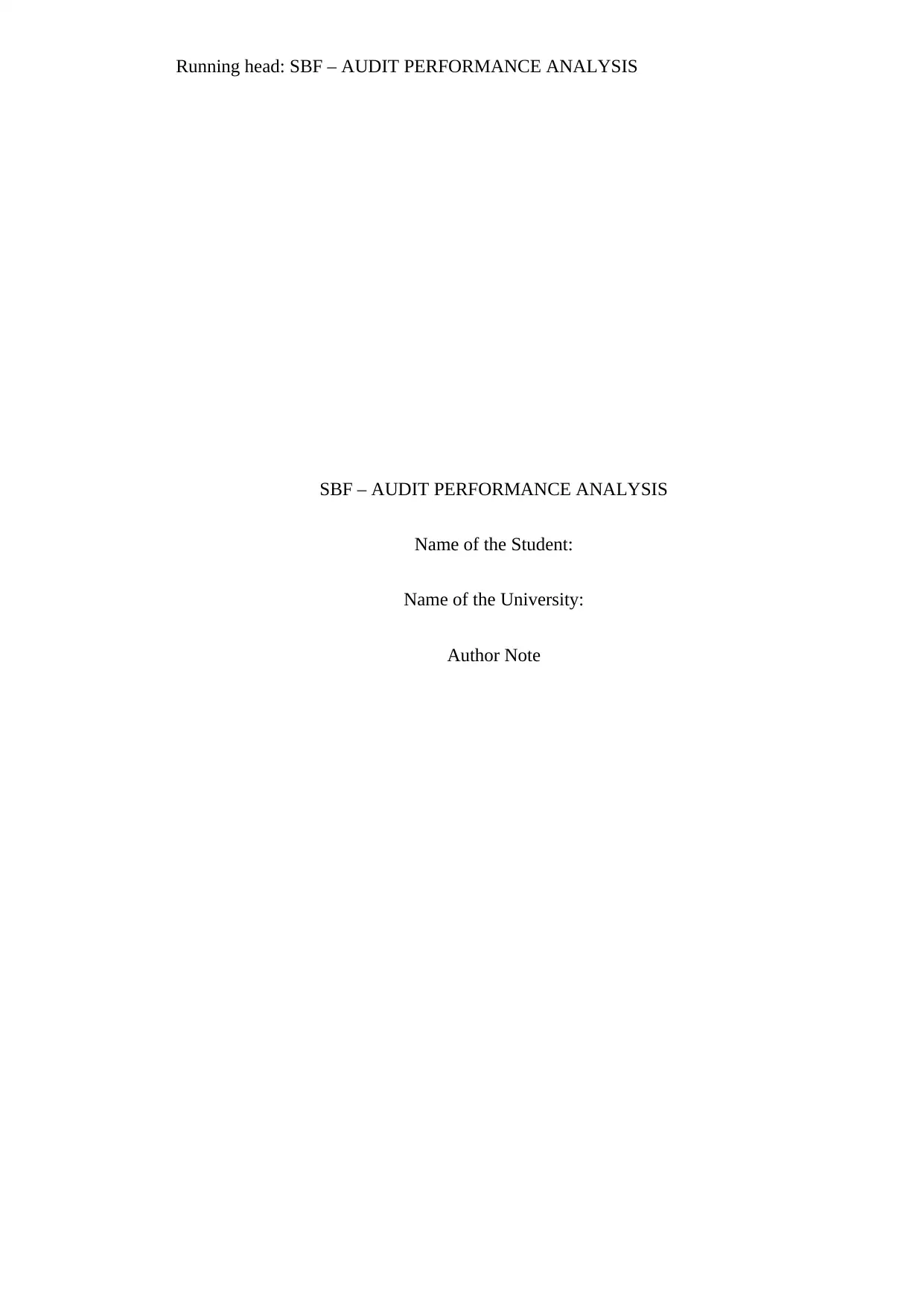
Running head: SBF – AUDIT PERFORMANCE ANALYSIS
SBF – AUDIT PERFORMANCE ANALYSIS
Name of the Student:
Name of the University:
Author Note
SBF – AUDIT PERFORMANCE ANALYSIS
Name of the Student:
Name of the University:
Author Note
Paraphrase This Document
Need a fresh take? Get an instant paraphrase of this document with our AI Paraphraser
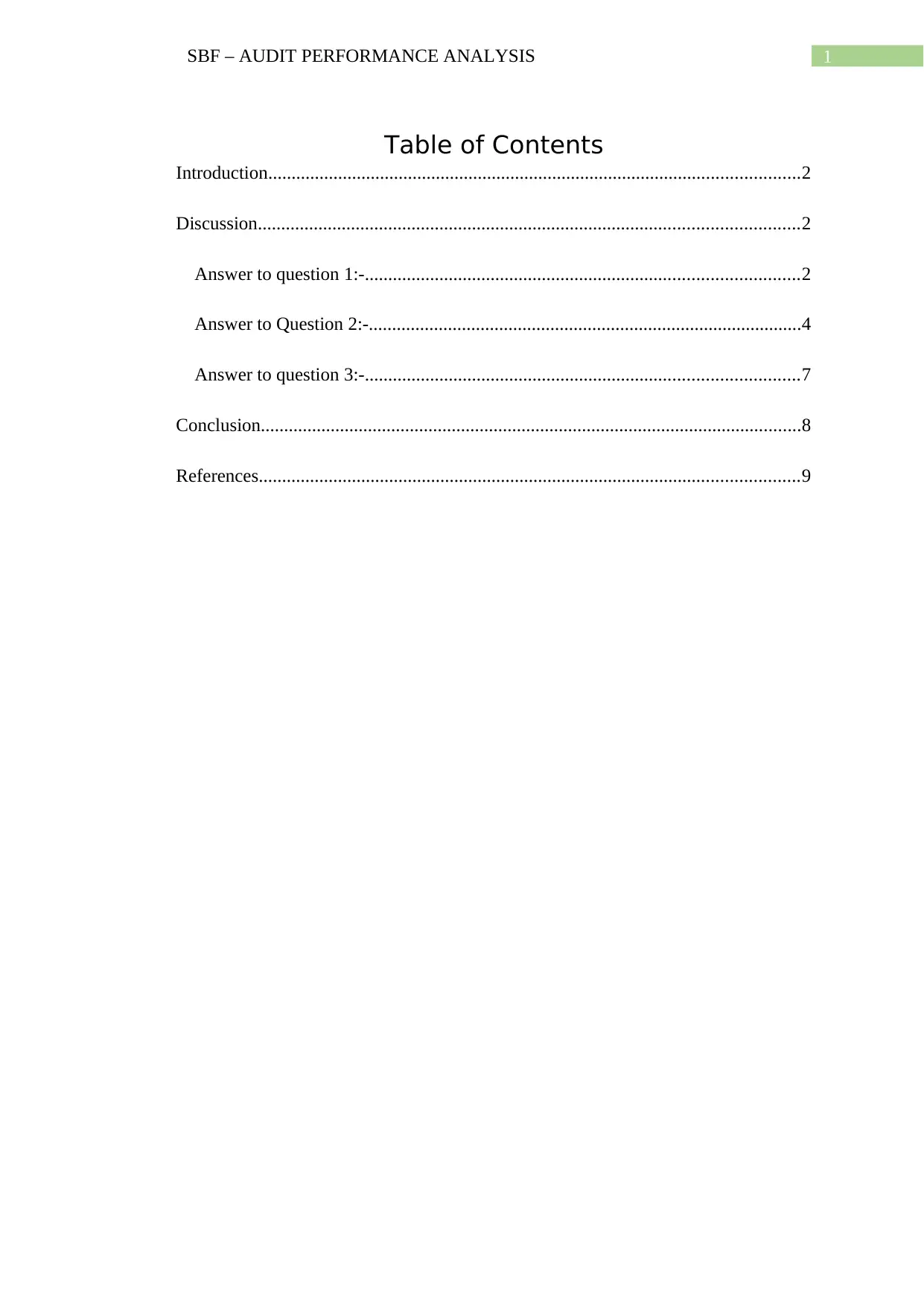
1SBF – AUDIT PERFORMANCE ANALYSIS
Table of Contents
Introduction..................................................................................................................2
Discussion....................................................................................................................2
Answer to question 1:-.............................................................................................2
Answer to Question 2:-.............................................................................................4
Answer to question 3:-.............................................................................................7
Conclusion....................................................................................................................8
References....................................................................................................................9
Table of Contents
Introduction..................................................................................................................2
Discussion....................................................................................................................2
Answer to question 1:-.............................................................................................2
Answer to Question 2:-.............................................................................................4
Answer to question 3:-.............................................................................................7
Conclusion....................................................................................................................8
References....................................................................................................................9
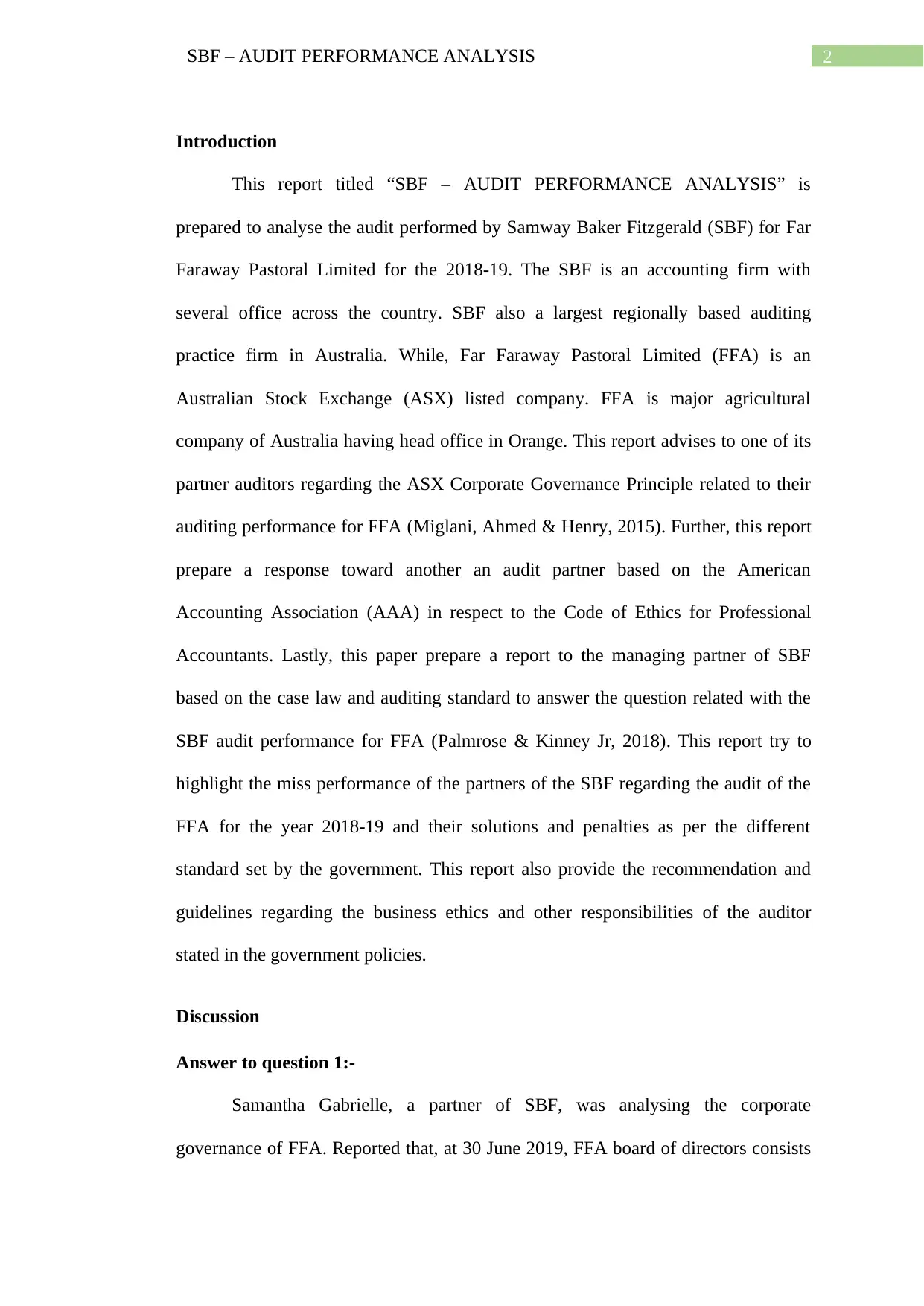
2SBF – AUDIT PERFORMANCE ANALYSIS
Introduction
This report titled “SBF – AUDIT PERFORMANCE ANALYSIS” is
prepared to analyse the audit performed by Samway Baker Fitzgerald (SBF) for Far
Faraway Pastoral Limited for the 2018-19. The SBF is an accounting firm with
several office across the country. SBF also a largest regionally based auditing
practice firm in Australia. While, Far Faraway Pastoral Limited (FFA) is an
Australian Stock Exchange (ASX) listed company. FFA is major agricultural
company of Australia having head office in Orange. This report advises to one of its
partner auditors regarding the ASX Corporate Governance Principle related to their
auditing performance for FFA (Miglani, Ahmed & Henry, 2015). Further, this report
prepare a response toward another an audit partner based on the American
Accounting Association (AAA) in respect to the Code of Ethics for Professional
Accountants. Lastly, this paper prepare a report to the managing partner of SBF
based on the case law and auditing standard to answer the question related with the
SBF audit performance for FFA (Palmrose & Kinney Jr, 2018). This report try to
highlight the miss performance of the partners of the SBF regarding the audit of the
FFA for the year 2018-19 and their solutions and penalties as per the different
standard set by the government. This report also provide the recommendation and
guidelines regarding the business ethics and other responsibilities of the auditor
stated in the government policies.
Discussion
Answer to question 1:-
Samantha Gabrielle, a partner of SBF, was analysing the corporate
governance of FFA. Reported that, at 30 June 2019, FFA board of directors consists
Introduction
This report titled “SBF – AUDIT PERFORMANCE ANALYSIS” is
prepared to analyse the audit performed by Samway Baker Fitzgerald (SBF) for Far
Faraway Pastoral Limited for the 2018-19. The SBF is an accounting firm with
several office across the country. SBF also a largest regionally based auditing
practice firm in Australia. While, Far Faraway Pastoral Limited (FFA) is an
Australian Stock Exchange (ASX) listed company. FFA is major agricultural
company of Australia having head office in Orange. This report advises to one of its
partner auditors regarding the ASX Corporate Governance Principle related to their
auditing performance for FFA (Miglani, Ahmed & Henry, 2015). Further, this report
prepare a response toward another an audit partner based on the American
Accounting Association (AAA) in respect to the Code of Ethics for Professional
Accountants. Lastly, this paper prepare a report to the managing partner of SBF
based on the case law and auditing standard to answer the question related with the
SBF audit performance for FFA (Palmrose & Kinney Jr, 2018). This report try to
highlight the miss performance of the partners of the SBF regarding the audit of the
FFA for the year 2018-19 and their solutions and penalties as per the different
standard set by the government. This report also provide the recommendation and
guidelines regarding the business ethics and other responsibilities of the auditor
stated in the government policies.
Discussion
Answer to question 1:-
Samantha Gabrielle, a partner of SBF, was analysing the corporate
governance of FFA. Reported that, at 30 June 2019, FFA board of directors consists
⊘ This is a preview!⊘
Do you want full access?
Subscribe today to unlock all pages.

Trusted by 1+ million students worldwide
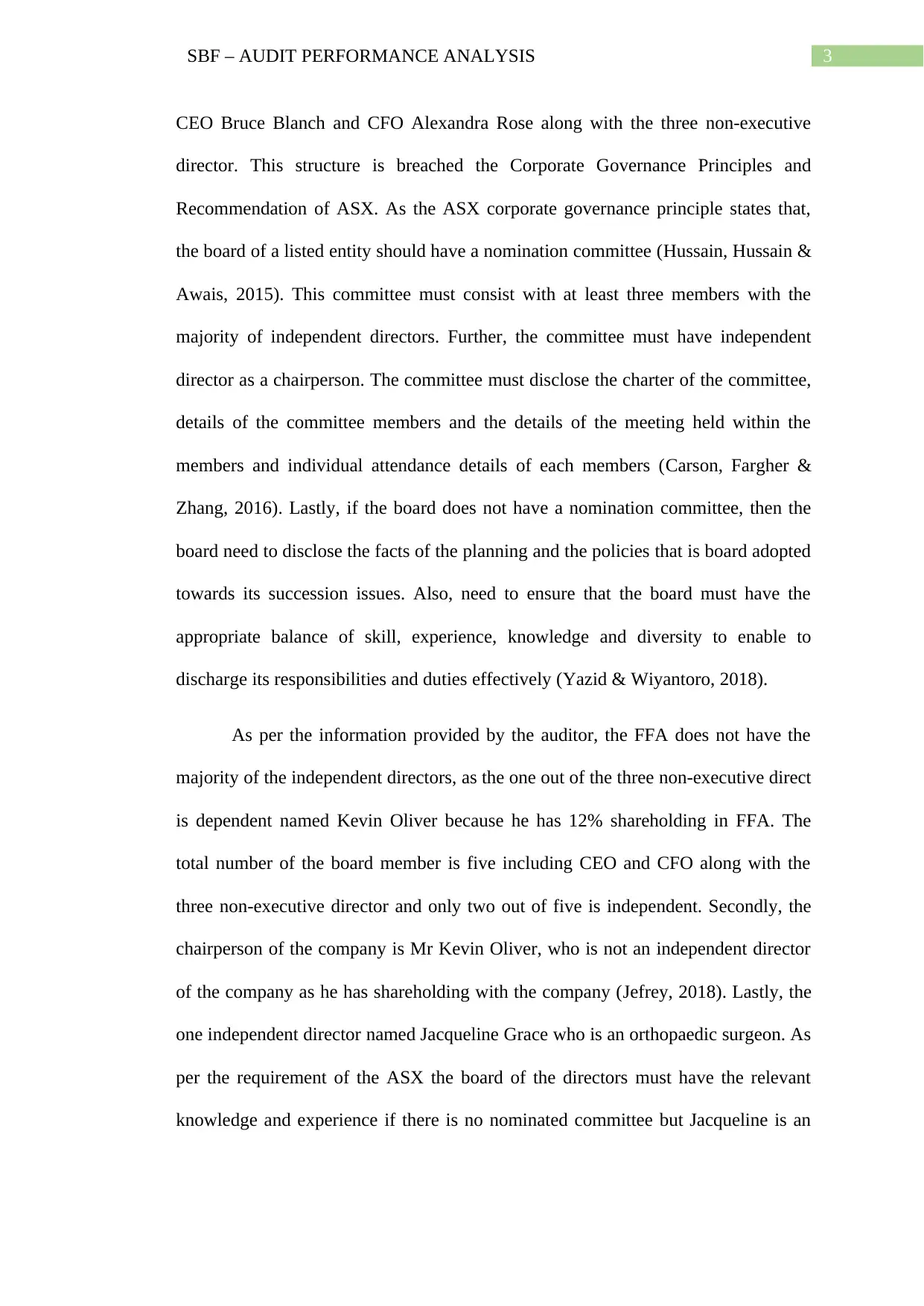
3SBF – AUDIT PERFORMANCE ANALYSIS
CEO Bruce Blanch and CFO Alexandra Rose along with the three non-executive
director. This structure is breached the Corporate Governance Principles and
Recommendation of ASX. As the ASX corporate governance principle states that,
the board of a listed entity should have a nomination committee (Hussain, Hussain &
Awais, 2015). This committee must consist with at least three members with the
majority of independent directors. Further, the committee must have independent
director as a chairperson. The committee must disclose the charter of the committee,
details of the committee members and the details of the meeting held within the
members and individual attendance details of each members (Carson, Fargher &
Zhang, 2016). Lastly, if the board does not have a nomination committee, then the
board need to disclose the facts of the planning and the policies that is board adopted
towards its succession issues. Also, need to ensure that the board must have the
appropriate balance of skill, experience, knowledge and diversity to enable to
discharge its responsibilities and duties effectively (Yazid & Wiyantoro, 2018).
As per the information provided by the auditor, the FFA does not have the
majority of the independent directors, as the one out of the three non-executive direct
is dependent named Kevin Oliver because he has 12% shareholding in FFA. The
total number of the board member is five including CEO and CFO along with the
three non-executive director and only two out of five is independent. Secondly, the
chairperson of the company is Mr Kevin Oliver, who is not an independent director
of the company as he has shareholding with the company (Jefrey, 2018). Lastly, the
one independent director named Jacqueline Grace who is an orthopaedic surgeon. As
per the requirement of the ASX the board of the directors must have the relevant
knowledge and experience if there is no nominated committee but Jacqueline is an
CEO Bruce Blanch and CFO Alexandra Rose along with the three non-executive
director. This structure is breached the Corporate Governance Principles and
Recommendation of ASX. As the ASX corporate governance principle states that,
the board of a listed entity should have a nomination committee (Hussain, Hussain &
Awais, 2015). This committee must consist with at least three members with the
majority of independent directors. Further, the committee must have independent
director as a chairperson. The committee must disclose the charter of the committee,
details of the committee members and the details of the meeting held within the
members and individual attendance details of each members (Carson, Fargher &
Zhang, 2016). Lastly, if the board does not have a nomination committee, then the
board need to disclose the facts of the planning and the policies that is board adopted
towards its succession issues. Also, need to ensure that the board must have the
appropriate balance of skill, experience, knowledge and diversity to enable to
discharge its responsibilities and duties effectively (Yazid & Wiyantoro, 2018).
As per the information provided by the auditor, the FFA does not have the
majority of the independent directors, as the one out of the three non-executive direct
is dependent named Kevin Oliver because he has 12% shareholding in FFA. The
total number of the board member is five including CEO and CFO along with the
three non-executive director and only two out of five is independent. Secondly, the
chairperson of the company is Mr Kevin Oliver, who is not an independent director
of the company as he has shareholding with the company (Jefrey, 2018). Lastly, the
one independent director named Jacqueline Grace who is an orthopaedic surgeon. As
per the requirement of the ASX the board of the directors must have the relevant
knowledge and experience if there is no nominated committee but Jacqueline is an
Paraphrase This Document
Need a fresh take? Get an instant paraphrase of this document with our AI Paraphraser
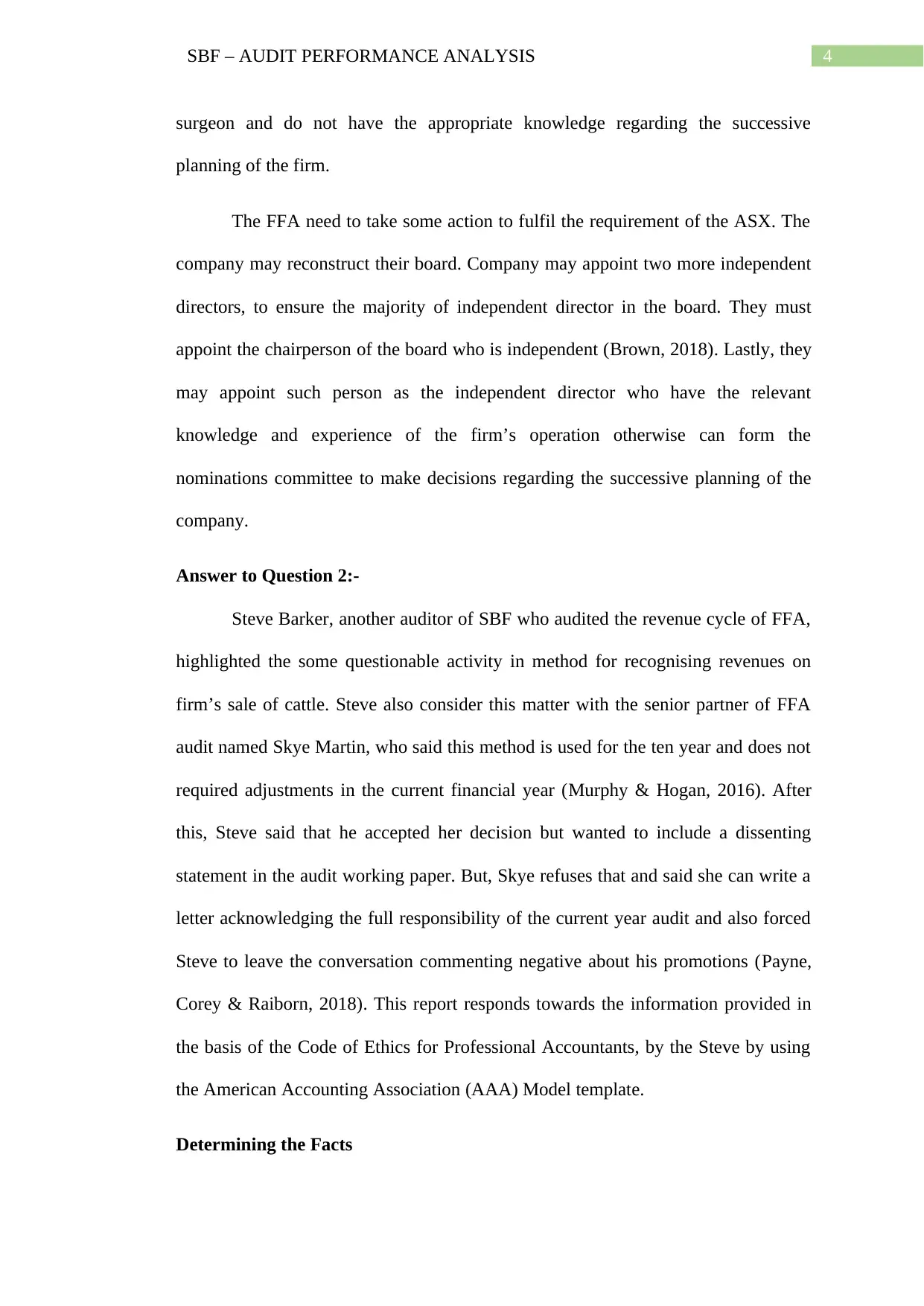
4SBF – AUDIT PERFORMANCE ANALYSIS
surgeon and do not have the appropriate knowledge regarding the successive
planning of the firm.
The FFA need to take some action to fulfil the requirement of the ASX. The
company may reconstruct their board. Company may appoint two more independent
directors, to ensure the majority of independent director in the board. They must
appoint the chairperson of the board who is independent (Brown, 2018). Lastly, they
may appoint such person as the independent director who have the relevant
knowledge and experience of the firm’s operation otherwise can form the
nominations committee to make decisions regarding the successive planning of the
company.
Answer to Question 2:-
Steve Barker, another auditor of SBF who audited the revenue cycle of FFA,
highlighted the some questionable activity in method for recognising revenues on
firm’s sale of cattle. Steve also consider this matter with the senior partner of FFA
audit named Skye Martin, who said this method is used for the ten year and does not
required adjustments in the current financial year (Murphy & Hogan, 2016). After
this, Steve said that he accepted her decision but wanted to include a dissenting
statement in the audit working paper. But, Skye refuses that and said she can write a
letter acknowledging the full responsibility of the current year audit and also forced
Steve to leave the conversation commenting negative about his promotions (Payne,
Corey & Raiborn, 2018). This report responds towards the information provided in
the basis of the Code of Ethics for Professional Accountants, by the Steve by using
the American Accounting Association (AAA) Model template.
Determining the Facts
surgeon and do not have the appropriate knowledge regarding the successive
planning of the firm.
The FFA need to take some action to fulfil the requirement of the ASX. The
company may reconstruct their board. Company may appoint two more independent
directors, to ensure the majority of independent director in the board. They must
appoint the chairperson of the board who is independent (Brown, 2018). Lastly, they
may appoint such person as the independent director who have the relevant
knowledge and experience of the firm’s operation otherwise can form the
nominations committee to make decisions regarding the successive planning of the
company.
Answer to Question 2:-
Steve Barker, another auditor of SBF who audited the revenue cycle of FFA,
highlighted the some questionable activity in method for recognising revenues on
firm’s sale of cattle. Steve also consider this matter with the senior partner of FFA
audit named Skye Martin, who said this method is used for the ten year and does not
required adjustments in the current financial year (Murphy & Hogan, 2016). After
this, Steve said that he accepted her decision but wanted to include a dissenting
statement in the audit working paper. But, Skye refuses that and said she can write a
letter acknowledging the full responsibility of the current year audit and also forced
Steve to leave the conversation commenting negative about his promotions (Payne,
Corey & Raiborn, 2018). This report responds towards the information provided in
the basis of the Code of Ethics for Professional Accountants, by the Steve by using
the American Accounting Association (AAA) Model template.
Determining the Facts
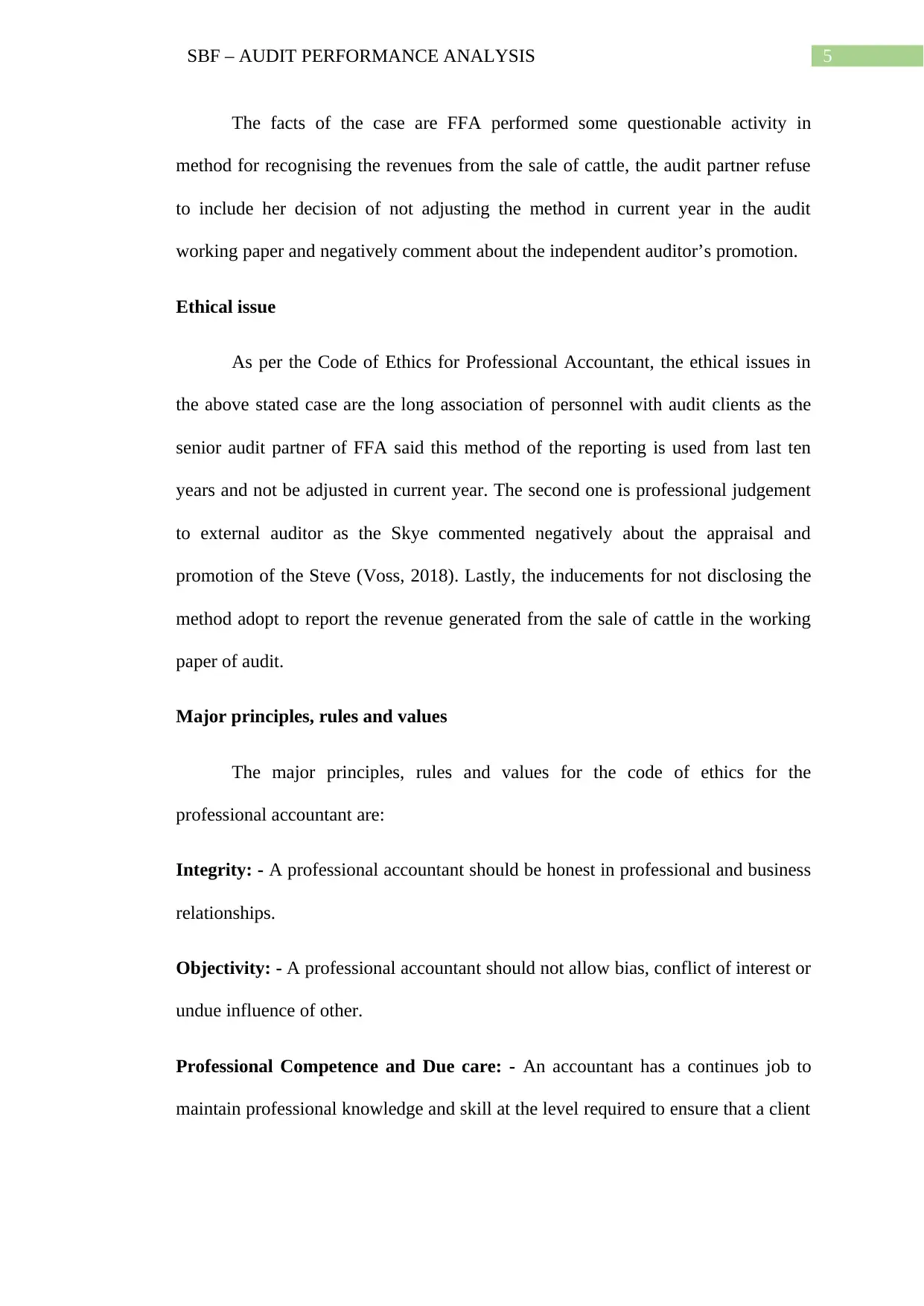
5SBF – AUDIT PERFORMANCE ANALYSIS
The facts of the case are FFA performed some questionable activity in
method for recognising the revenues from the sale of cattle, the audit partner refuse
to include her decision of not adjusting the method in current year in the audit
working paper and negatively comment about the independent auditor’s promotion.
Ethical issue
As per the Code of Ethics for Professional Accountant, the ethical issues in
the above stated case are the long association of personnel with audit clients as the
senior audit partner of FFA said this method of the reporting is used from last ten
years and not be adjusted in current year. The second one is professional judgement
to external auditor as the Skye commented negatively about the appraisal and
promotion of the Steve (Voss, 2018). Lastly, the inducements for not disclosing the
method adopt to report the revenue generated from the sale of cattle in the working
paper of audit.
Major principles, rules and values
The major principles, rules and values for the code of ethics for the
professional accountant are:
Integrity: - A professional accountant should be honest in professional and business
relationships.
Objectivity: - A professional accountant should not allow bias, conflict of interest or
undue influence of other.
Professional Competence and Due care: - An accountant has a continues job to
maintain professional knowledge and skill at the level required to ensure that a client
The facts of the case are FFA performed some questionable activity in
method for recognising the revenues from the sale of cattle, the audit partner refuse
to include her decision of not adjusting the method in current year in the audit
working paper and negatively comment about the independent auditor’s promotion.
Ethical issue
As per the Code of Ethics for Professional Accountant, the ethical issues in
the above stated case are the long association of personnel with audit clients as the
senior audit partner of FFA said this method of the reporting is used from last ten
years and not be adjusted in current year. The second one is professional judgement
to external auditor as the Skye commented negatively about the appraisal and
promotion of the Steve (Voss, 2018). Lastly, the inducements for not disclosing the
method adopt to report the revenue generated from the sale of cattle in the working
paper of audit.
Major principles, rules and values
The major principles, rules and values for the code of ethics for the
professional accountant are:
Integrity: - A professional accountant should be honest in professional and business
relationships.
Objectivity: - A professional accountant should not allow bias, conflict of interest or
undue influence of other.
Professional Competence and Due care: - An accountant has a continues job to
maintain professional knowledge and skill at the level required to ensure that a client
⊘ This is a preview!⊘
Do you want full access?
Subscribe today to unlock all pages.

Trusted by 1+ million students worldwide
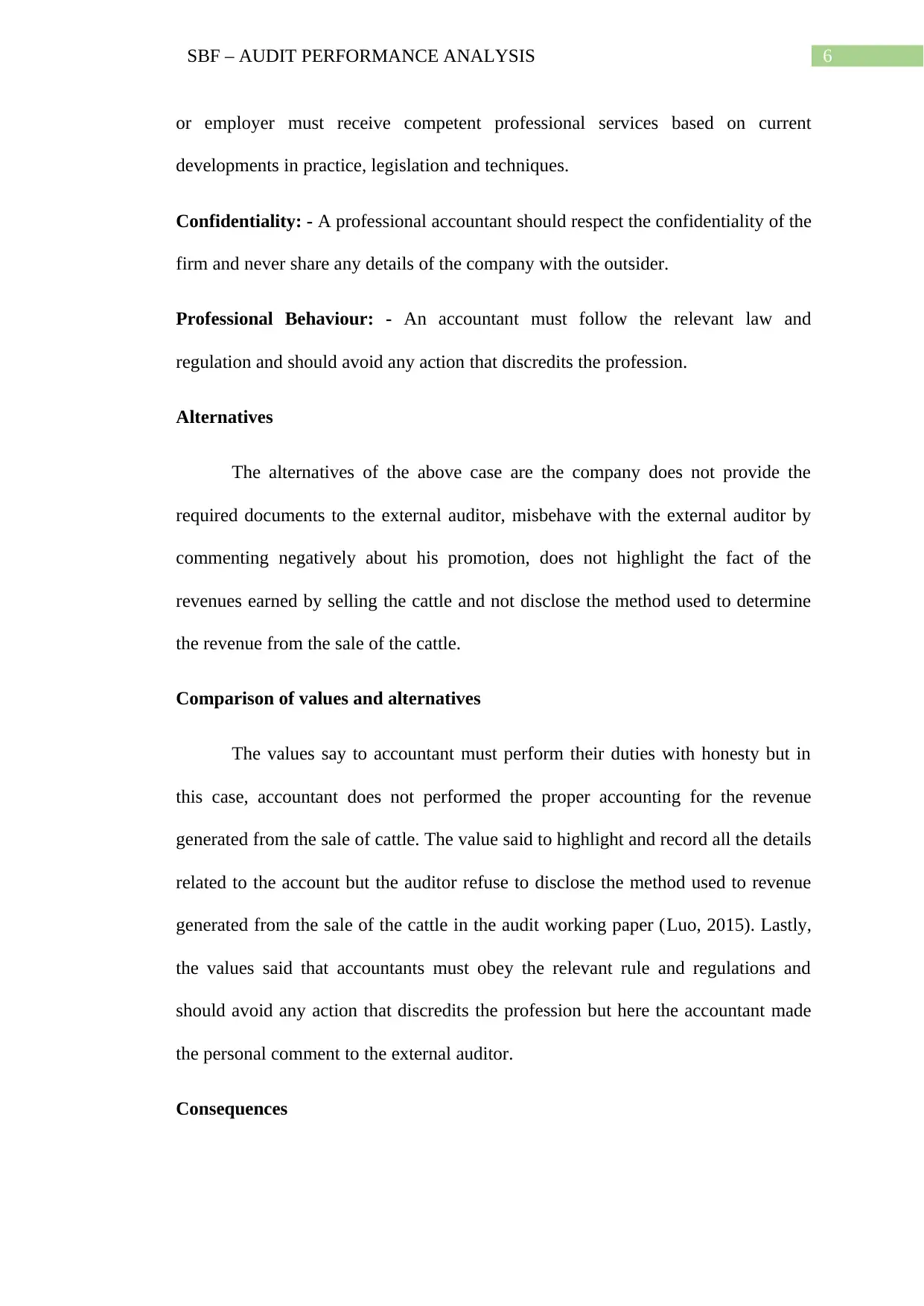
6SBF – AUDIT PERFORMANCE ANALYSIS
or employer must receive competent professional services based on current
developments in practice, legislation and techniques.
Confidentiality: - A professional accountant should respect the confidentiality of the
firm and never share any details of the company with the outsider.
Professional Behaviour: - An accountant must follow the relevant law and
regulation and should avoid any action that discredits the profession.
Alternatives
The alternatives of the above case are the company does not provide the
required documents to the external auditor, misbehave with the external auditor by
commenting negatively about his promotion, does not highlight the fact of the
revenues earned by selling the cattle and not disclose the method used to determine
the revenue from the sale of the cattle.
Comparison of values and alternatives
The values say to accountant must perform their duties with honesty but in
this case, accountant does not performed the proper accounting for the revenue
generated from the sale of cattle. The value said to highlight and record all the details
related to the account but the auditor refuse to disclose the method used to revenue
generated from the sale of the cattle in the audit working paper (Luo, 2015). Lastly,
the values said that accountants must obey the relevant rule and regulations and
should avoid any action that discredits the profession but here the accountant made
the personal comment to the external auditor.
Consequences
or employer must receive competent professional services based on current
developments in practice, legislation and techniques.
Confidentiality: - A professional accountant should respect the confidentiality of the
firm and never share any details of the company with the outsider.
Professional Behaviour: - An accountant must follow the relevant law and
regulation and should avoid any action that discredits the profession.
Alternatives
The alternatives of the above case are the company does not provide the
required documents to the external auditor, misbehave with the external auditor by
commenting negatively about his promotion, does not highlight the fact of the
revenues earned by selling the cattle and not disclose the method used to determine
the revenue from the sale of the cattle.
Comparison of values and alternatives
The values say to accountant must perform their duties with honesty but in
this case, accountant does not performed the proper accounting for the revenue
generated from the sale of cattle. The value said to highlight and record all the details
related to the account but the auditor refuse to disclose the method used to revenue
generated from the sale of the cattle in the audit working paper (Luo, 2015). Lastly,
the values said that accountants must obey the relevant rule and regulations and
should avoid any action that discredits the profession but here the accountant made
the personal comment to the external auditor.
Consequences
Paraphrase This Document
Need a fresh take? Get an instant paraphrase of this document with our AI Paraphraser
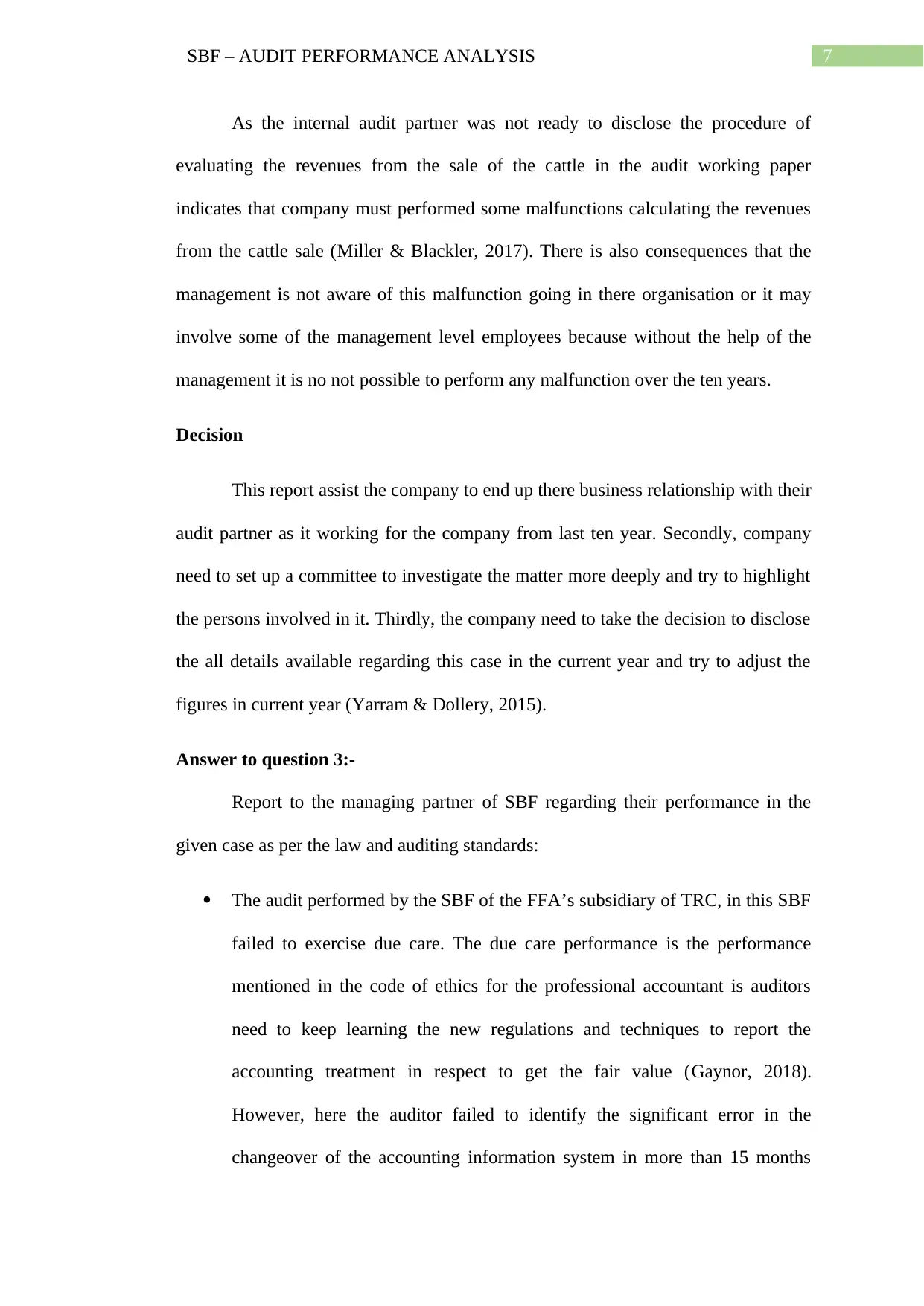
7SBF – AUDIT PERFORMANCE ANALYSIS
As the internal audit partner was not ready to disclose the procedure of
evaluating the revenues from the sale of the cattle in the audit working paper
indicates that company must performed some malfunctions calculating the revenues
from the cattle sale (Miller & Blackler, 2017). There is also consequences that the
management is not aware of this malfunction going in there organisation or it may
involve some of the management level employees because without the help of the
management it is no not possible to perform any malfunction over the ten years.
Decision
This report assist the company to end up there business relationship with their
audit partner as it working for the company from last ten year. Secondly, company
need to set up a committee to investigate the matter more deeply and try to highlight
the persons involved in it. Thirdly, the company need to take the decision to disclose
the all details available regarding this case in the current year and try to adjust the
figures in current year (Yarram & Dollery, 2015).
Answer to question 3:-
Report to the managing partner of SBF regarding their performance in the
given case as per the law and auditing standards:
The audit performed by the SBF of the FFA’s subsidiary of TRC, in this SBF
failed to exercise due care. The due care performance is the performance
mentioned in the code of ethics for the professional accountant is auditors
need to keep learning the new regulations and techniques to report the
accounting treatment in respect to get the fair value (Gaynor, 2018).
However, here the auditor failed to identify the significant error in the
changeover of the accounting information system in more than 15 months
As the internal audit partner was not ready to disclose the procedure of
evaluating the revenues from the sale of the cattle in the audit working paper
indicates that company must performed some malfunctions calculating the revenues
from the cattle sale (Miller & Blackler, 2017). There is also consequences that the
management is not aware of this malfunction going in there organisation or it may
involve some of the management level employees because without the help of the
management it is no not possible to perform any malfunction over the ten years.
Decision
This report assist the company to end up there business relationship with their
audit partner as it working for the company from last ten year. Secondly, company
need to set up a committee to investigate the matter more deeply and try to highlight
the persons involved in it. Thirdly, the company need to take the decision to disclose
the all details available regarding this case in the current year and try to adjust the
figures in current year (Yarram & Dollery, 2015).
Answer to question 3:-
Report to the managing partner of SBF regarding their performance in the
given case as per the law and auditing standards:
The audit performed by the SBF of the FFA’s subsidiary of TRC, in this SBF
failed to exercise due care. The due care performance is the performance
mentioned in the code of ethics for the professional accountant is auditors
need to keep learning the new regulations and techniques to report the
accounting treatment in respect to get the fair value (Gaynor, 2018).
However, here the auditor failed to identify the significant error in the
changeover of the accounting information system in more than 15 months
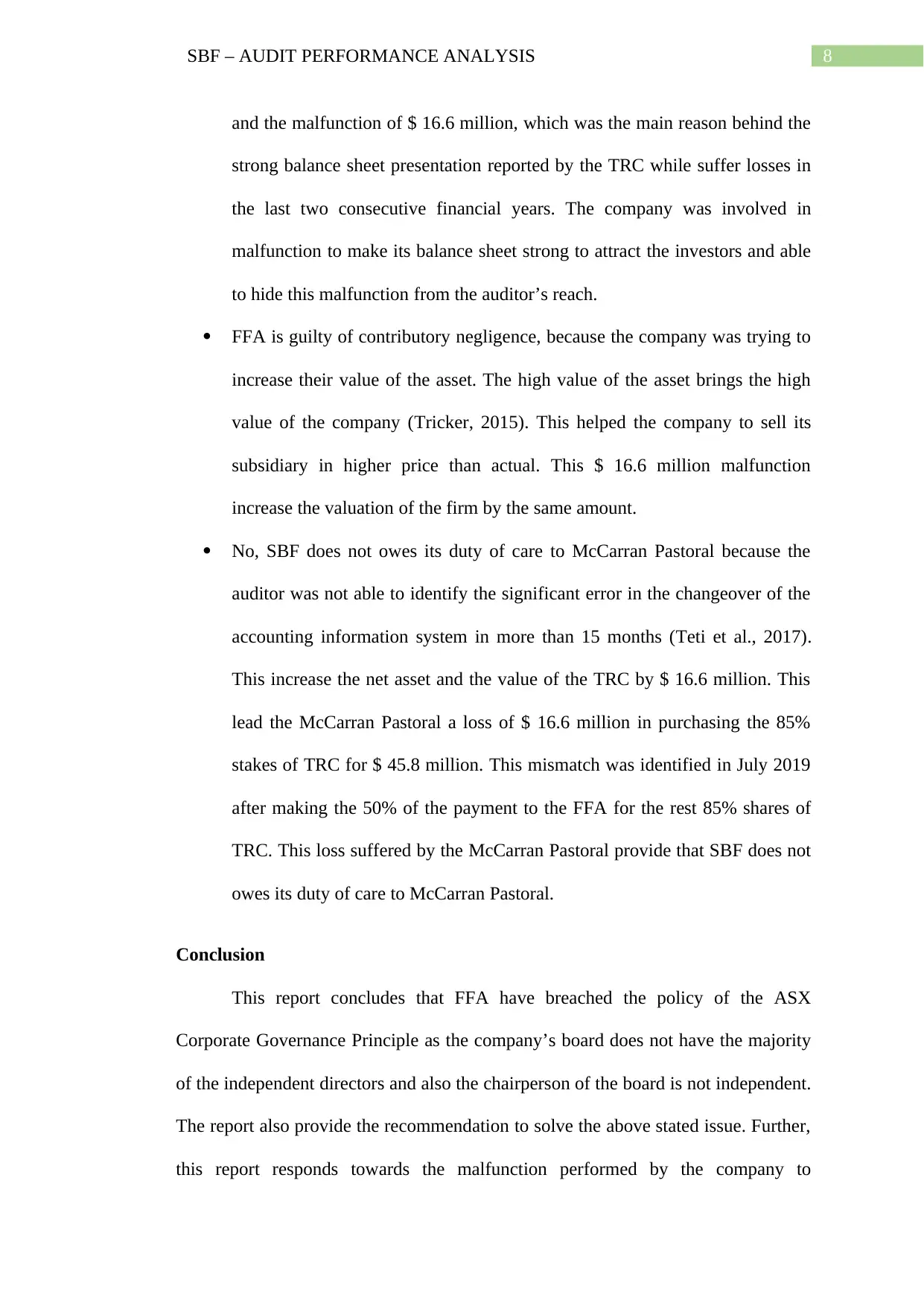
8SBF – AUDIT PERFORMANCE ANALYSIS
and the malfunction of $ 16.6 million, which was the main reason behind the
strong balance sheet presentation reported by the TRC while suffer losses in
the last two consecutive financial years. The company was involved in
malfunction to make its balance sheet strong to attract the investors and able
to hide this malfunction from the auditor’s reach.
FFA is guilty of contributory negligence, because the company was trying to
increase their value of the asset. The high value of the asset brings the high
value of the company (Tricker, 2015). This helped the company to sell its
subsidiary in higher price than actual. This $ 16.6 million malfunction
increase the valuation of the firm by the same amount.
No, SBF does not owes its duty of care to McCarran Pastoral because the
auditor was not able to identify the significant error in the changeover of the
accounting information system in more than 15 months (Teti et al., 2017).
This increase the net asset and the value of the TRC by $ 16.6 million. This
lead the McCarran Pastoral a loss of $ 16.6 million in purchasing the 85%
stakes of TRC for $ 45.8 million. This mismatch was identified in July 2019
after making the 50% of the payment to the FFA for the rest 85% shares of
TRC. This loss suffered by the McCarran Pastoral provide that SBF does not
owes its duty of care to McCarran Pastoral.
Conclusion
This report concludes that FFA have breached the policy of the ASX
Corporate Governance Principle as the company’s board does not have the majority
of the independent directors and also the chairperson of the board is not independent.
The report also provide the recommendation to solve the above stated issue. Further,
this report responds towards the malfunction performed by the company to
and the malfunction of $ 16.6 million, which was the main reason behind the
strong balance sheet presentation reported by the TRC while suffer losses in
the last two consecutive financial years. The company was involved in
malfunction to make its balance sheet strong to attract the investors and able
to hide this malfunction from the auditor’s reach.
FFA is guilty of contributory negligence, because the company was trying to
increase their value of the asset. The high value of the asset brings the high
value of the company (Tricker, 2015). This helped the company to sell its
subsidiary in higher price than actual. This $ 16.6 million malfunction
increase the valuation of the firm by the same amount.
No, SBF does not owes its duty of care to McCarran Pastoral because the
auditor was not able to identify the significant error in the changeover of the
accounting information system in more than 15 months (Teti et al., 2017).
This increase the net asset and the value of the TRC by $ 16.6 million. This
lead the McCarran Pastoral a loss of $ 16.6 million in purchasing the 85%
stakes of TRC for $ 45.8 million. This mismatch was identified in July 2019
after making the 50% of the payment to the FFA for the rest 85% shares of
TRC. This loss suffered by the McCarran Pastoral provide that SBF does not
owes its duty of care to McCarran Pastoral.
Conclusion
This report concludes that FFA have breached the policy of the ASX
Corporate Governance Principle as the company’s board does not have the majority
of the independent directors and also the chairperson of the board is not independent.
The report also provide the recommendation to solve the above stated issue. Further,
this report responds towards the malfunction performed by the company to
⊘ This is a preview!⊘
Do you want full access?
Subscribe today to unlock all pages.

Trusted by 1+ million students worldwide
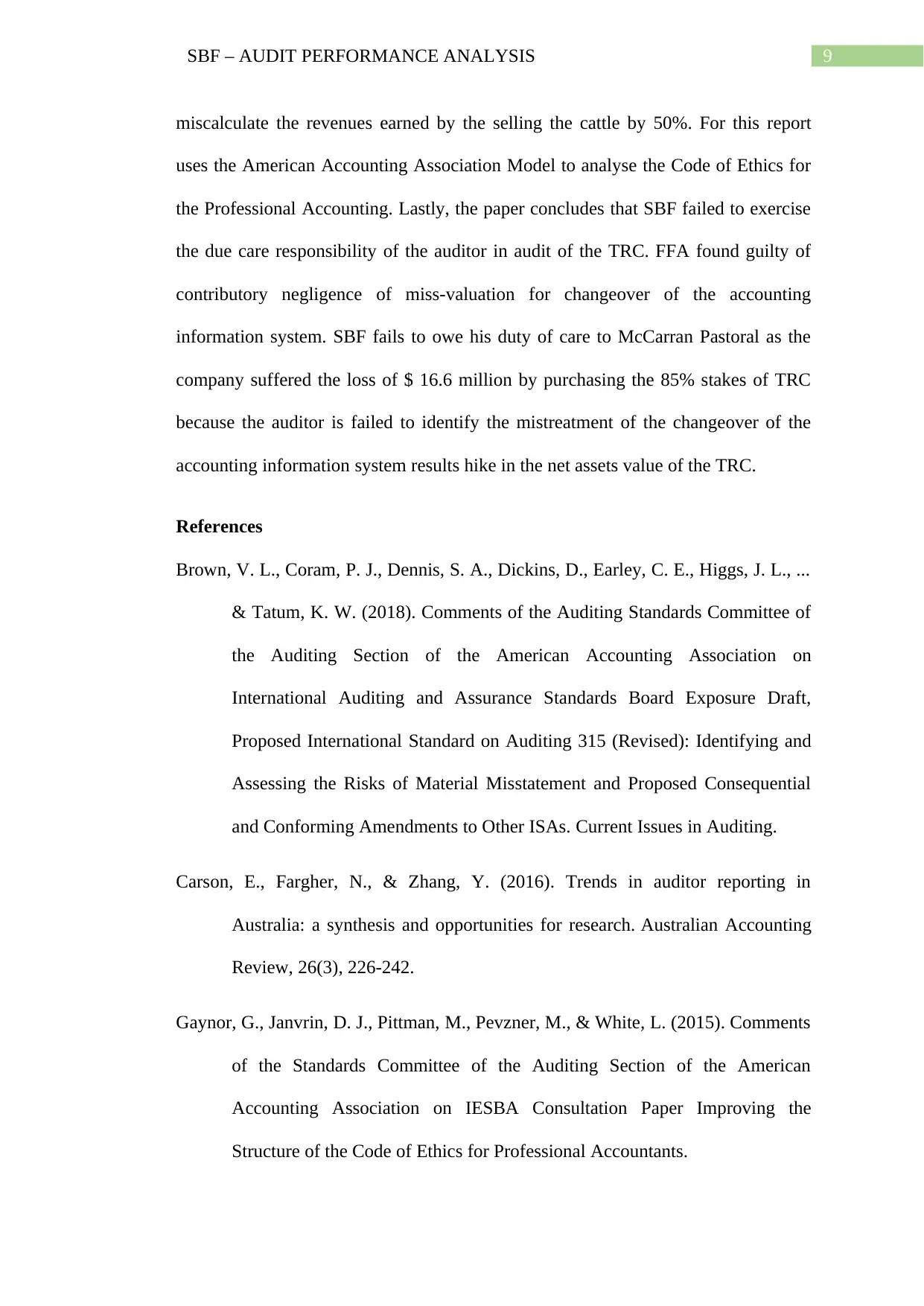
9SBF – AUDIT PERFORMANCE ANALYSIS
miscalculate the revenues earned by the selling the cattle by 50%. For this report
uses the American Accounting Association Model to analyse the Code of Ethics for
the Professional Accounting. Lastly, the paper concludes that SBF failed to exercise
the due care responsibility of the auditor in audit of the TRC. FFA found guilty of
contributory negligence of miss-valuation for changeover of the accounting
information system. SBF fails to owe his duty of care to McCarran Pastoral as the
company suffered the loss of $ 16.6 million by purchasing the 85% stakes of TRC
because the auditor is failed to identify the mistreatment of the changeover of the
accounting information system results hike in the net assets value of the TRC.
References
Brown, V. L., Coram, P. J., Dennis, S. A., Dickins, D., Earley, C. E., Higgs, J. L., ...
& Tatum, K. W. (2018). Comments of the Auditing Standards Committee of
the Auditing Section of the American Accounting Association on
International Auditing and Assurance Standards Board Exposure Draft,
Proposed International Standard on Auditing 315 (Revised): Identifying and
Assessing the Risks of Material Misstatement and Proposed Consequential
and Conforming Amendments to Other ISAs. Current Issues in Auditing.
Carson, E., Fargher, N., & Zhang, Y. (2016). Trends in auditor reporting in
Australia: a synthesis and opportunities for research. Australian Accounting
Review, 26(3), 226-242.
Gaynor, G., Janvrin, D. J., Pittman, M., Pevzner, M., & White, L. (2015). Comments
of the Standards Committee of the Auditing Section of the American
Accounting Association on IESBA Consultation Paper Improving the
Structure of the Code of Ethics for Professional Accountants.
miscalculate the revenues earned by the selling the cattle by 50%. For this report
uses the American Accounting Association Model to analyse the Code of Ethics for
the Professional Accounting. Lastly, the paper concludes that SBF failed to exercise
the due care responsibility of the auditor in audit of the TRC. FFA found guilty of
contributory negligence of miss-valuation for changeover of the accounting
information system. SBF fails to owe his duty of care to McCarran Pastoral as the
company suffered the loss of $ 16.6 million by purchasing the 85% stakes of TRC
because the auditor is failed to identify the mistreatment of the changeover of the
accounting information system results hike in the net assets value of the TRC.
References
Brown, V. L., Coram, P. J., Dennis, S. A., Dickins, D., Earley, C. E., Higgs, J. L., ...
& Tatum, K. W. (2018). Comments of the Auditing Standards Committee of
the Auditing Section of the American Accounting Association on
International Auditing and Assurance Standards Board Exposure Draft,
Proposed International Standard on Auditing 315 (Revised): Identifying and
Assessing the Risks of Material Misstatement and Proposed Consequential
and Conforming Amendments to Other ISAs. Current Issues in Auditing.
Carson, E., Fargher, N., & Zhang, Y. (2016). Trends in auditor reporting in
Australia: a synthesis and opportunities for research. Australian Accounting
Review, 26(3), 226-242.
Gaynor, G., Janvrin, D. J., Pittman, M., Pevzner, M., & White, L. (2015). Comments
of the Standards Committee of the Auditing Section of the American
Accounting Association on IESBA Consultation Paper Improving the
Structure of the Code of Ethics for Professional Accountants.
Paraphrase This Document
Need a fresh take? Get an instant paraphrase of this document with our AI Paraphraser
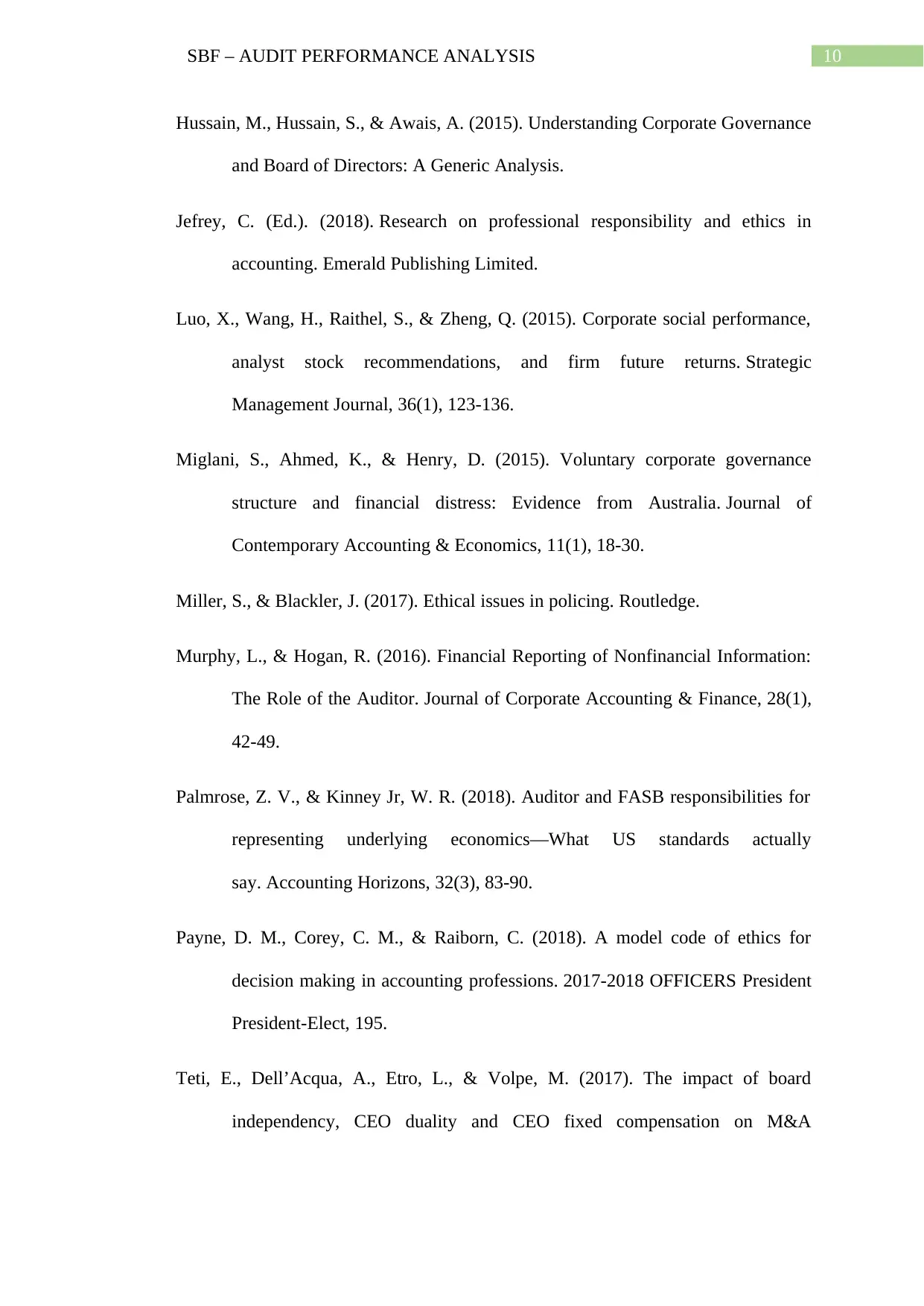
10SBF – AUDIT PERFORMANCE ANALYSIS
Hussain, M., Hussain, S., & Awais, A. (2015). Understanding Corporate Governance
and Board of Directors: A Generic Analysis.
Jefrey, C. (Ed.). (2018). Research on professional responsibility and ethics in
accounting. Emerald Publishing Limited.
Luo, X., Wang, H., Raithel, S., & Zheng, Q. (2015). Corporate social performance,
analyst stock recommendations, and firm future returns. Strategic
Management Journal, 36(1), 123-136.
Miglani, S., Ahmed, K., & Henry, D. (2015). Voluntary corporate governance
structure and financial distress: Evidence from Australia. Journal of
Contemporary Accounting & Economics, 11(1), 18-30.
Miller, S., & Blackler, J. (2017). Ethical issues in policing. Routledge.
Murphy, L., & Hogan, R. (2016). Financial Reporting of Nonfinancial Information:
The Role of the Auditor. Journal of Corporate Accounting & Finance, 28(1),
42-49.
Palmrose, Z. V., & Kinney Jr, W. R. (2018). Auditor and FASB responsibilities for
representing underlying economics—What US standards actually
say. Accounting Horizons, 32(3), 83-90.
Payne, D. M., Corey, C. M., & Raiborn, C. (2018). A model code of ethics for
decision making in accounting professions. 2017-2018 OFFICERS President
President-Elect, 195.
Teti, E., Dell’Acqua, A., Etro, L., & Volpe, M. (2017). The impact of board
independency, CEO duality and CEO fixed compensation on M&A
Hussain, M., Hussain, S., & Awais, A. (2015). Understanding Corporate Governance
and Board of Directors: A Generic Analysis.
Jefrey, C. (Ed.). (2018). Research on professional responsibility and ethics in
accounting. Emerald Publishing Limited.
Luo, X., Wang, H., Raithel, S., & Zheng, Q. (2015). Corporate social performance,
analyst stock recommendations, and firm future returns. Strategic
Management Journal, 36(1), 123-136.
Miglani, S., Ahmed, K., & Henry, D. (2015). Voluntary corporate governance
structure and financial distress: Evidence from Australia. Journal of
Contemporary Accounting & Economics, 11(1), 18-30.
Miller, S., & Blackler, J. (2017). Ethical issues in policing. Routledge.
Murphy, L., & Hogan, R. (2016). Financial Reporting of Nonfinancial Information:
The Role of the Auditor. Journal of Corporate Accounting & Finance, 28(1),
42-49.
Palmrose, Z. V., & Kinney Jr, W. R. (2018). Auditor and FASB responsibilities for
representing underlying economics—What US standards actually
say. Accounting Horizons, 32(3), 83-90.
Payne, D. M., Corey, C. M., & Raiborn, C. (2018). A model code of ethics for
decision making in accounting professions. 2017-2018 OFFICERS President
President-Elect, 195.
Teti, E., Dell’Acqua, A., Etro, L., & Volpe, M. (2017). The impact of board
independency, CEO duality and CEO fixed compensation on M&A
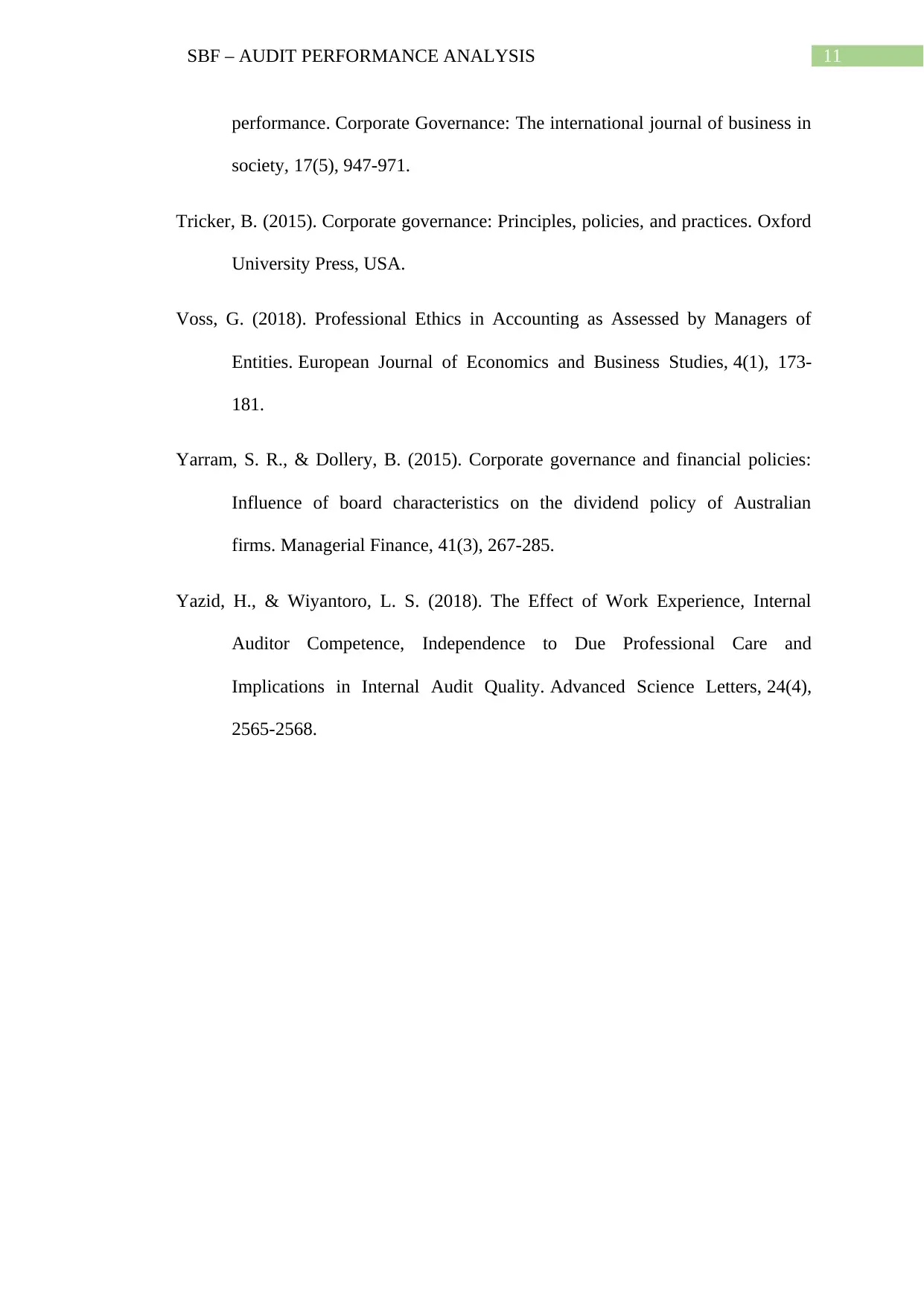
11SBF – AUDIT PERFORMANCE ANALYSIS
performance. Corporate Governance: The international journal of business in
society, 17(5), 947-971.
Tricker, B. (2015). Corporate governance: Principles, policies, and practices. Oxford
University Press, USA.
Voss, G. (2018). Professional Ethics in Accounting as Assessed by Managers of
Entities. European Journal of Economics and Business Studies, 4(1), 173-
181.
Yarram, S. R., & Dollery, B. (2015). Corporate governance and financial policies:
Influence of board characteristics on the dividend policy of Australian
firms. Managerial Finance, 41(3), 267-285.
Yazid, H., & Wiyantoro, L. S. (2018). The Effect of Work Experience, Internal
Auditor Competence, Independence to Due Professional Care and
Implications in Internal Audit Quality. Advanced Science Letters, 24(4),
2565-2568.
performance. Corporate Governance: The international journal of business in
society, 17(5), 947-971.
Tricker, B. (2015). Corporate governance: Principles, policies, and practices. Oxford
University Press, USA.
Voss, G. (2018). Professional Ethics in Accounting as Assessed by Managers of
Entities. European Journal of Economics and Business Studies, 4(1), 173-
181.
Yarram, S. R., & Dollery, B. (2015). Corporate governance and financial policies:
Influence of board characteristics on the dividend policy of Australian
firms. Managerial Finance, 41(3), 267-285.
Yazid, H., & Wiyantoro, L. S. (2018). The Effect of Work Experience, Internal
Auditor Competence, Independence to Due Professional Care and
Implications in Internal Audit Quality. Advanced Science Letters, 24(4),
2565-2568.
⊘ This is a preview!⊘
Do you want full access?
Subscribe today to unlock all pages.

Trusted by 1+ million students worldwide
1 out of 12
Related Documents
Your All-in-One AI-Powered Toolkit for Academic Success.
+13062052269
info@desklib.com
Available 24*7 on WhatsApp / Email
![[object Object]](/_next/static/media/star-bottom.7253800d.svg)
Unlock your academic potential
Copyright © 2020–2026 A2Z Services. All Rights Reserved. Developed and managed by ZUCOL.





